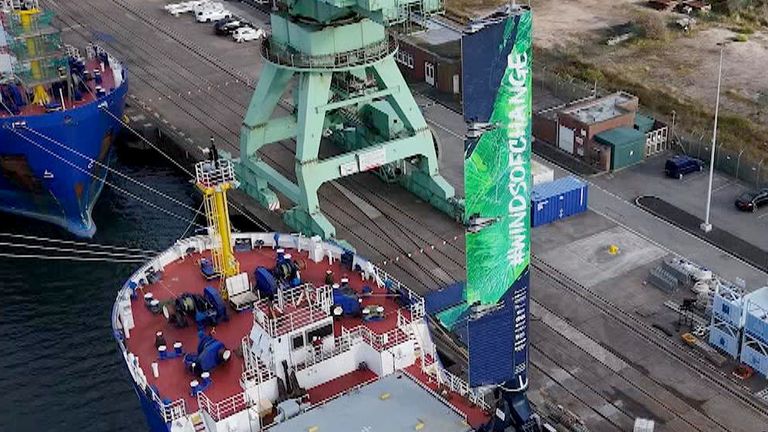The first UK trial of a rigid sail that can be fitted on commercial ships to reduce their carbon footprint is under way in the Irish Sea.
The sail being tested is more like an aircraft wing than the traditional sheet of billowing canvas. And the vessel it’s been fixed to is no ordinary ship either.
It’s one of the UK’s fleet of three nuclear transport vessels, specially designed to move high-level nuclear waste and spent nuclear fuel stored at Sellafield in Cumbria to destinations like Japan under long-standing nuclear decommissioning treaties.
“When this opportunity came up for us to trial a sail, we thought we’d be ideally placed to support a UK company that’s looking at an effective solution,” said Peter Buchan, managing director of shipping at Nuclear Transport Solutions, which is part of the government-owned Nuclear Decommissioning Authority.
“We’ve got highly safe and highly secure operations, so if you can make a sail work in our environment, then I’m sure that’s able to be translatable to right across the maritime industry.”
Most commercial ships have 30 or 40-year life spans and there are currently few alternatives to oil-burning engines for most ship types.
It’s why the overall contribution of shipping to global greenhouse gas emissions is expected to grow from a 3% share today to 10% by 2050.
The industry is also squeezed by volatile fuel prices, meaning growing interest from the industry in modern iterations of an ancient technology.
There have been previous demonstrations of various types of sail technologies fitted to ships, including kites, revolving wind-powered generators and wing-like sails.
But detailed evidence of how ships designed for diesel power perform under sail and how well they work on modern routes is lacking, say industry experts.
The trial, supported by the Department for Transport, is the first in the UK to test a rigid sail retrofitted to an existing vessel.
FastRig is a 20-metre retractable wing with control flaps similar to an aircraft built by Dumfries-based Smart Green Shipping.
“In theory we can move things through water with wind. We’ve done it for thousands of years. But how do we do it in a modern fleet?” said Diane Gilpin, the company’s founder.
“What impact does it have on the economics? What impact does it have on the crew? All of those details need to be ironed out, and that’s why we’re doing this trial.”
They’re not too worried about damaging the vessel.
The 100m-long Pacific Grebe that’s taking part in the two-week trial, has two hulls, two engines and propellors, and an array of security systems to keep nuclear cargoes safe.
Below decks are four radiation-shielded and heat-shielded holds designed to carry tonnes of high-level nuclear waste in specialised steel shipping flasks.
For the trial, it’s empty of hazardous cargo and fitted with a single FastRig sail.
Smart Green Shipping hopes to prove in the trial that ships fitted with several FastRig sails could see fuel and therefore emissions savings of up to 30%.



























